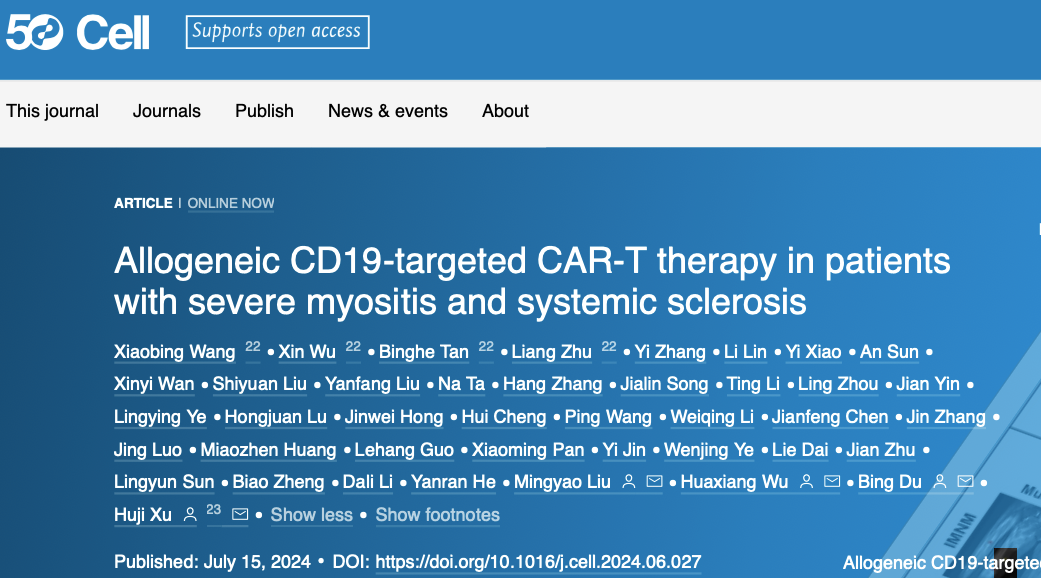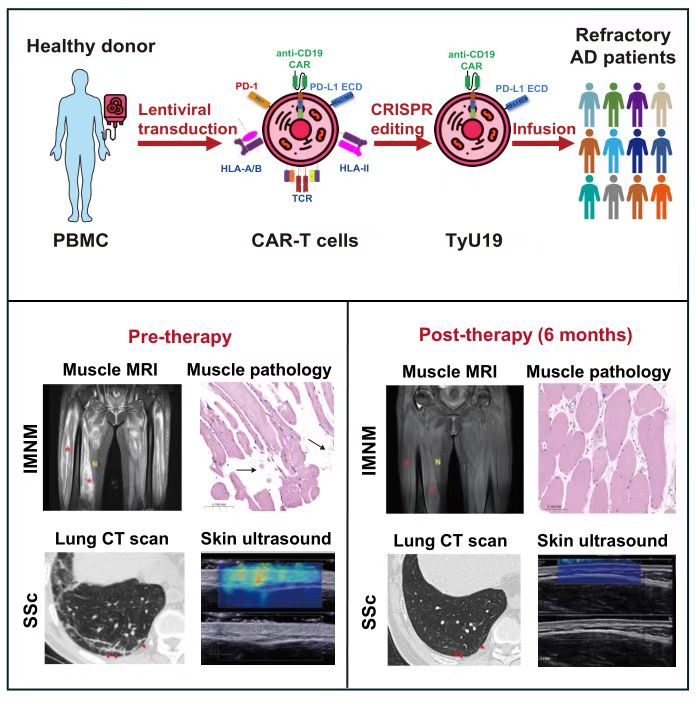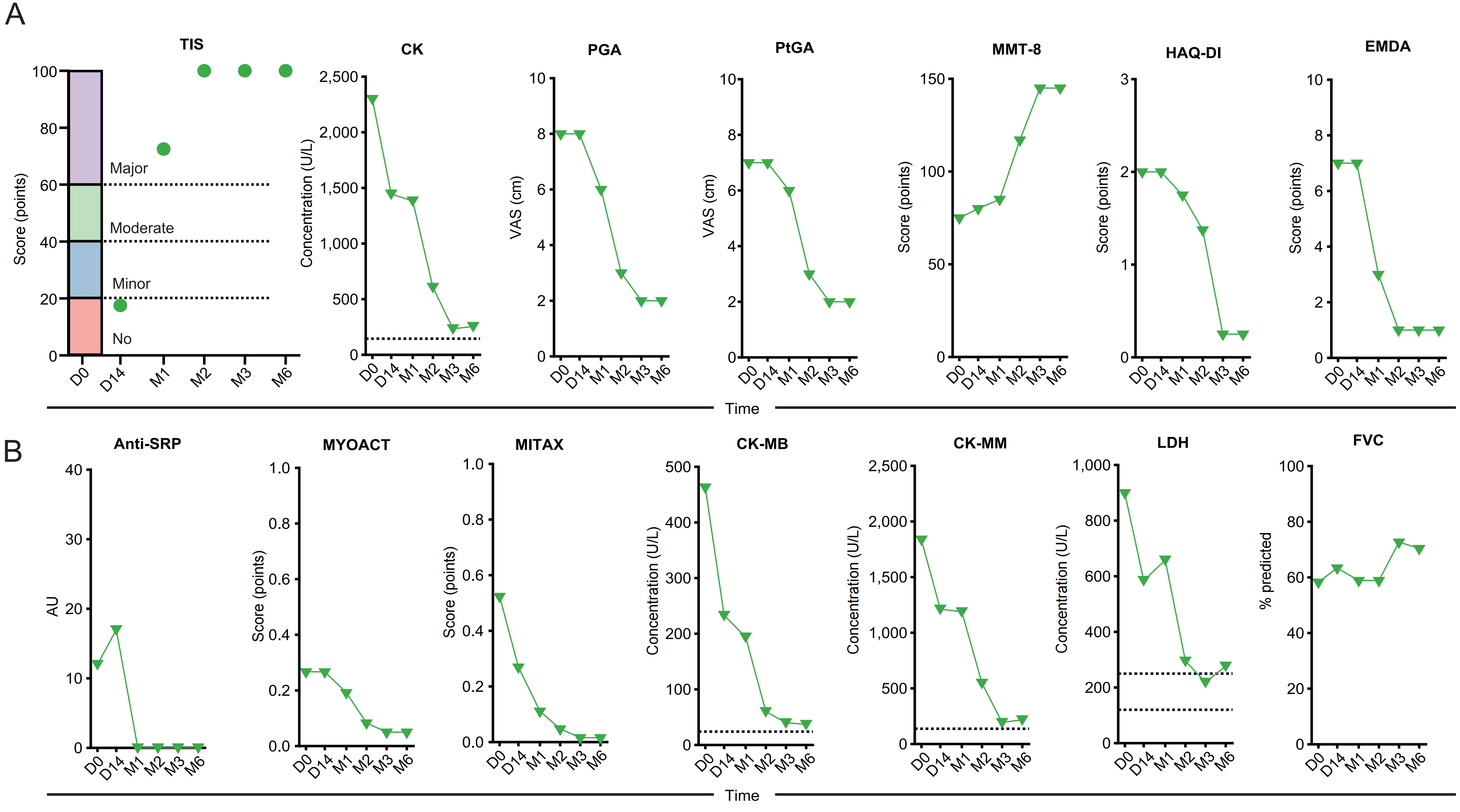

2024-07-16
On July 16, 2024, BRL Medicine Inc., a company focused on gene and cell therapy, announced that its collaborative research with East China Normal University and Shanghai Changzheng Hospital on a new generation of allogeneic universal CAR-T therapy (TyU19) for autoimmune diseases was officially published in the top international academic journal, Cell, on July 15. The paper titled "Allogeneic CD19-targeted CAR-T therapy in patients with severe myositis and systemic sclerosis" features Dr. Binghe Tan, Vice President of Production and CMC at BRL Medicine, as a co-first author, along with Professor Mingyao Liu, Founder and Chairman of BRL Medicine, and Professor Bing Du, Co-founder and Vice President, as co-corresponding authors. Notably, this marks the first international report of success in allogeneic universal CAR-T therapy for autoimmune diseases and the inaugural publication of CAR-T research outcomes in the top journal Cell. This represents a pivotal breakthrough for BRL Medicine in the field of CAR-T, particularly in allogeneic universal CAR-T therapy for autoimmune diseases, and signifies a qualitative leap in technological differentiation and innovation within the cell and gene therapy sector.

In this study, TyU19 is an allogeneic universal CAR-T cell therapy product targeting the CD19 antigen, developed by BRL Medicine based on its proprietary universal cell platform (TyUCell®). It possesses numerous characteristics such as high accessibility, low cost, and stable quality, and has demonstrated significant efficacy and high safety in clinical trials. It is worth celebrating that the clinical trial application (IND) for BRL Medicine's "Targeted CD19 Gene-Modified Allogeneic Chimeric Antigen Receptor T-Cell Injection" (Pipeline Code: BRL-301), which relies on this product, was approved by the Center for Drug Evaluation (CDE) of the China Food and Drug Administration in July 2023 for the treatment of "B-Acute Lymphoblastic Leukemia". The research results published in the form of an Article in the journal Cell represent another significant application scenario for BRL Medicine's new generation of UCAR-T product, TyU19, in "autoimmune diseases".
The UCAR-T product 'TyU19' from BRL Medicine has undergone a comprehensive upgrade, offering enhanced accessibility for patients
TyU19 represents a novel UCAR-T product that encapsulates the essence of years of research and development by the BRL Medicine team in the fields of gene editing, immune recognition, and immunocyte therapy. Through a sophisticated multi-gene, selective gene editing strategy (Figure 1), it not only effectively avoids the potential risk of graft-versus-host disease in allogeneic cell transplantation but also perfectly overcomes the most critical technical barrier in the development of allogeneic universal CAR-T products: the patient's immune system's rejection of allogeneic cells. On the basis of ensuring the safety and effectiveness of cellular products, it truly achieves the universalization of immunocyte therapy products. Clinical studies have shown that during the treatment process, rapid expansion and long-term maintenance in patients can be achieved without the need for deep lymphodepletion preconditioning (lower than that required for autologous CAR-T), ultimately effectively eliminating CD19-positive target cells in patients. It can be said that the technological breakthrough of TyU19 has laid a solid foundation for the excellent efficacy and high safety demonstrated in the treatment of tumor and autoimmune disease patients.

Figure 1: The Design and In Vivo Functioning of the UCAR-T Product 'TyU19' by BRL Medicine Inc
In this study, the research team successfully treated three patients with refractory autoimmune diseases using BRL Medicine's UCAR-T product, TyU19. One of the patients was diagnosed with immune-mediated necrotizing myositis (IMNM), and two with systemic sclerosis (SSc). The IMNM subject, a 42-year-old female, did not exhibit any symptoms of fever or cytokine storm following treatment with TyU19 cells. Her total improvement score (TIS) rapidly increased from a baseline of 72.5 to 100 within two months and remained stable during subsequent follow-up periods. Imaging and pathological examinations also demonstrated significant alleviation of muscle inflammation in the patient. The study also enrolled two subjects with severe SSc who received TyU19 cell therapy. Both patients showed significant improvements in their CRISS scores within a few months, and in terms of skin fibrosis, their modified Rodnan skin scores (mRSS) significantly decreased. Furthermore, after TyU19 treatment, all patients' B cells were completely eradicated, and the autoimmune antibodies in the IMNM patient were completely eliminated (Figure 2). The significant organ fibrosis damage in the two SSc patients was reversed, and they continued to improve over a six-month monitoring period (Figure 3). The entire treatment process was well tolerated, with no observed cytokine release syndrome (CRS), graft-versus-host disease (GvHD), or immune effector cell-associated neurotoxic syndrome (ICANS).

Figure 2 Clinical Assessment of IMNM Patients

Figure 3 Clinical Assessment of SSc Patients
The allogeneic UCAR-T product from BRL Medicine has significant potential for application
Dr. Binghe Tan, the first author of the paper, inventor of TyUCell® technology, and project leader, stated: "After several years of technical research and iterative upgrades, TyU19 has demonstrated outstanding performance in the treatment of both early B-cell acute lymphoblastic leukemia (B-ALL) and autoimmune diseases, fully indicating that our new generation of universal CAR-T products has successfully achieved the proof of concept in design. Furthermore, it has been granted IND approval for the B-ALL indication, successfully opening the path for pharmaceutical and clinical development of the product. Currently, in response to the characteristics of autoimmune diseases, our team is further conducting pharmaceutical and non-clinical research on the product, making every effort to advance the domestic and international application of this product, striving to bring safe, effective, and inclusive universal cell therapy drugs to the clinic at an early date, benefiting a wide range of patients."
Compared with similar products internationally, the new generation of UCAR-T products from BRL Medicine possesses the following clinical advantages:
1. Substantial Patient Accessibility
BRL Medicine's UCAR-T products have achieved effective immune evasion through systematic gene editing and modification. During the treatment process, there is no need for HLA typing screening of patients, enabling true off-the-shelf availability, which greatly expands the scope of application of the products. Moreover, a production scale of over 200 individuals per batch has been achieved, which not only significantly reduces production costs but also shortens patient waiting times, greatly enhancing the convenience of cell therapy products in clinical use. This has demonstrated remarkable advantages in clinical treatment.
2. Enhanced Clinical Safety
BRL Medicine's UCAR-T products do not require additional lymphodepletion or immunosuppression for patients. By employing conventional or even lower lymphodepletion regimens, complete eradication of tumor cells can be achieved, effectively avoiding the risks associated with excessive immunosuppression in patients, such as infections, agranulocytosis, and slow lymphocyte recovery, demonstrating high clinical safety.
3. Enhanced Clinical Therapeutic Outcomes
The T cells used in BRL Medicine's UCAR-T products are derived from young, healthy donors, and their activity significantly surpasses the immune cells of patients with long-term hematological disorders. After being re-infused into the body, they exhibit excellent proliferative potential and durability. In the early phase IIT studies of the product, BRL Medicine's UCAR-T has demonstrated significant and sustained tumor clearance capabilities, rapidly achieving complete remission of the disease.